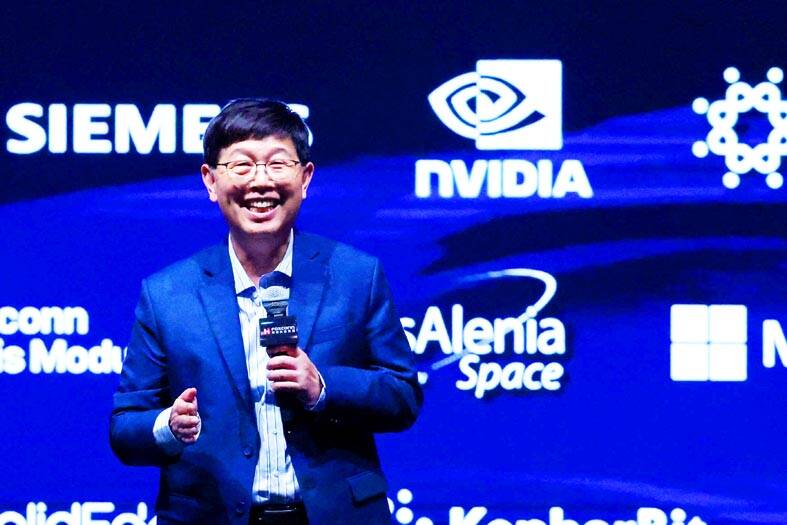Foxconn Technology Group (富士康科技集團) yesterday said it expects any impact of new tariffs from US president-elect Donald Trump to hit the company less than its rivals, citing its global manufacturing footprint.
Young Liu (劉揚偉), chairman of the contract manufacturer and key Apple Inc supplier, told reporters after a forum in Taipei that it saw the primary impact of any fresh tariffs falling on its clients because its business model is based on contract manufacturing.
“Clients may decide to shift production locations, but looking at Foxconn’s global footprint, we are ahead. As a result, the impact on us is likely smaller compared to our competitors,” he said.

Photo: Reuters
Trump on Monday said that on his first day in office he would impose a 25 percent tariff on all products from Mexico and Canada and would charge goods from China an additional 10 percent tariff.
Foxconn, the world’s largest contract electronics maker, has large facilities in China, including a giant iPhone assembly plant.
However, it has been increasing its investments in other countries, such as the US, Mexico and Vietnam, as part of a supply chain diversification effort. In Mexico, it is building a large manufacturing facility to produce Nvidia Corp’s GB200 superchips.
Liu said Foxconn would only be able to share more details about the company’s US plans after Jan. 20, once Trump takes office and his policies become clearer.
“After that, we will have a corresponding strategy in place,” he said.
“What you’re seeing now is a game between nations, not yet between companies. Whether it’s 25 percent or an additional 10 percent, the outcome is uncertain as they continue to negotiate. We are constantly adapting and refining our global strategy,” Liu said.
During Trump’s previous presidency from 2017 to 2021, Foxconn announced a US$10 billion investment in Wisconsin that the company later mostly abandoned. On Tuesday, Foxconn said a subsidiary had spent US$33 million to acquire land and factory buildings in Harris County, Texas.
Foxconn will continue investing in Mexico, Liu added, as it believed the trend was moving toward regional manufacturing.
Hon Hai Precision Industry Co (鴻海精密), the flagship firm of the group, has invested US$33.03 million to buy land and a building in Texas that sources say would be used to expand the company’s artificial intelligence server production in the US.
In a statement posted on the Taiwan Stock Exchange (TWSE), where Taiwan-based Hon Hai’s shares are traded, the company on Tuesday said that subsidiary Foxconn Assembly LLC has acquired 478,036m2 of land and a building with an area of 200,200m2 in Harris County.
At an investors’ conference last month, Liu said his company would continue to invest in artificial intelligence products and electric vehicles in the US market.
According to Liu, Hon Hai has invested in the US for almost four decades and now operates 50 facilities there with a workforce of about 5,000 people that generate US$25.6 billion in annual sales.
Additional reporting by CNA

Vincent Wei led fellow Singaporean farmers around an empty Malaysian plot, laying out plans for a greenhouse and rows of leafy vegetables. What he pitched was not just space for crops, but a lifeline for growers struggling to make ends meet in a city-state with high prices and little vacant land. The future agriculture hub is part of a joint special economic zone launched last year by the two neighbors, expected to cost US$123 million and produce 10,000 tonnes of fresh produce annually. It is attracting Singaporean farmers with promises of cheaper land, labor and energy just over the border.

US actor Matthew McConaughey has filed recordings of his image and voice with US patent authorities to protect them from unauthorized usage by artificial intelligence (AI) platforms, a representative said earlier this week. Several video clips and audio recordings were registered by the commercial arm of the Just Keep Livin’ Foundation, a non-profit created by the Oscar-winning actor and his wife, Camila, according to the US Patent and Trademark Office database. Many artists are increasingly concerned about the uncontrolled use of their image via generative AI since the rollout of ChatGPT and other AI-powered tools. Several US states have adopted

A proposed billionaires’ tax in California has ignited a political uproar in Silicon Valley, with tech titans threatening to leave the state while California Governor Gavin Newsom of the Democratic Party maneuvers to defeat a levy that he fears would lead to an exodus of wealth. A technology mecca, California has more billionaires than any other US state — a few hundred, by some estimates. About half its personal income tax revenue, a financial backbone in the nearly US$350 billion budget, comes from the top 1 percent of earners. A large healthcare union is attempting to place a proposal before

KEEPING UP: The acquisition of a cleanroom in Taiwan would enable Micron to increase production in a market where demand continues to outpace supply, a Micron official said Micron Technology Inc has signed a letter of intent to buy a fabrication site in Taiwan from Powerchip Semiconductor Manufacturing Corp (力積電) for US$1.8 billion to expand its production of memory chips. Micron would take control of the P5 site in Miaoli County’s Tongluo Township (銅鑼) and plans to ramp up DRAM production in phases after the transaction closes in the second quarter, the company said in a statement on Saturday. The acquisition includes an existing 12 inch fab cleanroom of 27,871m2 and would further position Micron to address growing global demand for memory solutions, the company said. Micron expects the transaction to